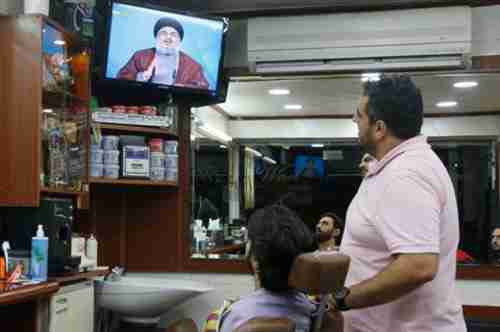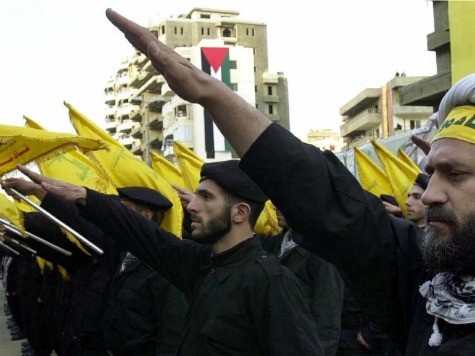
This morning’s key headlines from GenerationalDynamics.com
- How Hezbollah’s reluctant foray into Syria changed the Mideast
- Pakistan’s PM Nawaz Sharif under fire over peace talks with Taliban
How Hezbollah’s reluctant foray into Syria changed the Mideast

Nasrallah gives a televised speech on April 30 (Daily Star)
The Mideast changed dramatically on April 30 of this year, when SayyedHasan Nasrallah, the leader of the Lebanon-based Shia terror groupHezbollah, gave a televised speech saying that Hezbollah would militarily enter the fight in Syria,on the side of the regime of Syria’s president Bashar al-Assad, andthen followed up by winning an overwhelming victory against Syria’sopposition in Qusair. (See “6-Jun-13 World View — Syria and Hezbollah gloat over victory in town of Qusair”.)
That was the point in time when Syria’s civil war turned into a warbetween Sunnis and Shias in the Mideast. That was the time when theSunni terror group Jaish al-Muhajireen wa Ansar (the Army of theImmigrants) was formed in Russia’s Chechnya province for the purposeof fighting against the Alawite/Shia forces of the al-Assad. That wasthe time when the trickle of Sunni jihadists coming to Syria to fightbegan to turn into a flood, arriving from central Asia, northernAfrica, and Russia’s southern Caucasus provinces.
It turns out that many of Hezbollah’s leaders were reluctantto take the step into Syria. Hezbollah’s mission had neverbeen anything but leading “the resistance” — which is the phrasethat stands for expelling Israel from the region. These leadersfeared that abandoning the resistance going into Syria wouldmean that they would be permanently embroiled there for years,abandoning their main mission, the resistance.
So why did they go ahead with the Syria mission? It’s because theywere ordered to do so by Hezbollah’s master and funding source, Iran.Nasrallah’s announcement came just a few days after he returned from atrip to Tehran, where he had met with Iran’s Supreme Leader AyatollahSeyed Ali Khamenei. According to one Lebanese politician, “Nasrallahis not going to say ‘No’ to someone who has given him $30 billion overthe past 30 years.”
In many ways, the fears of the reluctant Hezbollah leaders have beenrealized. It now appears that Hezbollah will become fully immersed inthe Syrian war, and part of the larger conflict between Shias andSunnis that is growing in the region. According to one formerHezbollah leader, the minority Shias can never win a proxywar with Sunnis:
“Until recently, I had thought that armed resistance(against Israel) is a top priority and a precious goal… Thoseseeking to fortify the resistance should not drag it into warbetween Sunnis and Shi’ites… That strife will consumeeverybody.”
In addition, the Syrian conflict has been a new monetary disaster forIran. According to a Lebanese security official, “Syria is sucking upIran’s reserves, with the Islamic Republic paying between $600-700million a month (just towards the cost of fighting in Syria).”
It’s worth noting that this is the backdrop against which Iran hasbeen pursuing its so-called “charm offensive” at the United Nationsthis week. The Syrian conflict may have made Iran desperate enough toseek some kind of game changer, so Iran may be more willing to makeconcessions than we realize. Reuters
Pakistan’s PM Nawaz Sharif under fire over peace talks with Taliban
People in Pakistan are increasingly using the word “appeasement” todescribe the continuing insistence by the new prime minister NawazSharif to hold peace talks with Tehrik-e-Taliban Pakistan (TTP – thePakistani Taliban). It was a major campaign promise by Sharif thatinstead of getting tough with the TTP, he would end the constantstream of violent terrorist attacks across Pakistan by talking withthem. The TTP have indicated that they would be willing toparticipate in peace talks under certain conditions — TTP prisonersmust be released from jail, the army must be released from the tribalareas where it has been fighting the Taliban, and the government mustagree to impose Sharia law on the country. Sharif has certainly notrejected these demands, perhaps dreamily hoping that they could benegotiated down. But what’s really crushing Sharif’s dreams is thatTTP is continuing its major terrorist attacks — an attack that killedthree army officers on September 15 in Upper Dir, and a major attackon a Christian Church in Peshawar on September 22.
Former president Asif Ali Zardari, whose wife Benazir Bhutto waskilled by a terrorist attack in 2007, said last week in a veiledcriticism of Sharif:
“The greatest… threat to democracy emanates from themilitant mindset [that] seeks to impose their agenda throughforce.
If there has been any doubt about the futility of appeasing themilitants these must be removed by the incident in Upper Dirtoday.”
On the other hand, you have Imran Khan, the former cricket superstarturned anti-American politician who opposed Nawaz Sharif and lost, whocontinues to insist that peace talks with the TTP are the way to go,despite no letup in terrorist attacks.
In fact, there are a significant number of TTP supporters in Pakistan,no matter how many innocent people they blow up in mosques andchurches. Similarly, there are plenty of people who are so in lovewith Syria’s president Bashar al-Assad that no matter how manythousands of innocent women and children he orders raped, mutilated,massacred and slaughtered, they’ll continue to support and cherishhim. Here in the United States, President Obama could pick up a gunand kill somebody, and the NY Times and NBC News would find a way toblame it on the Republicans.
The increasing number of sycophants of the kind that I’ve justdescribed is characteristic of today’s generational Crisis era. InAmerica’s last Crisis era, one group of sycophants admired BenitoMussolini, saying that he kept the trains running on time, othersycophants admired Adolf Hitler for whatever reason, and a third groupadmired Josef Stalin because they loved Communism. This sycophanticadmiration for leaders, even when they turn into monsters, is whatcharacterized the last Crisis era and the current one, and is one ofthe reasons why a war is inevitable. Dawn (Pakistan) and Daily Times (Pakistan)
Permanent web link to this article
Receive daily World View columns by e-mail

COMMENTS
Please let us know if you're having issues with commenting.